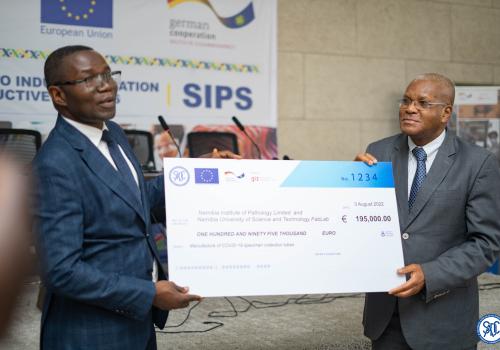The Support to Industrialization and Productive Sectors Programme (SIPS) Programme awarded three grants to relevant stakeholders in the leather, medical, and pharmaceutical value chains. The grants were awarded to three stakeholders, namely Solidaridad, Namibia Institute of Pathology Limited, and Chemical Process Technologies Pharma Pty (Ltd) on the margins of the 6th SADC Industrialisation Week in Kinshasa, DRC. The SIPS programme is one of the programmes that facilitate realisation of the SADC Regional Indicative Strategic Development Plan 2020-2030 (RISDP), which prioritises Industrial Development and Market Integration and places industrialisation at the Centre of the regional integration agenda.
The grants launch was held during the 6th SADC Industralisation week, graced by the H.E. Mr. Julien Paluku Kahongya, Minister of Industry, the Democratic Republic of Congo, SADC Deputy Executive Secretary for Corporate Affairs, H. E Ambassador Joseph Nourrice and Dr. Khutula Sibanda, Director of Industrial Development and Trade at SADC, who symbolically handed the cheques to the private sector enterprises.
In the leather value chain, Solidaridad received a grant for $500.000 to promote green innovative solutions in the leather sector of Tanzania and Zimbabwe and create market linkages for leather products at a domestic, regional and international level. Solidaridad is an international civil society organization with over 50 years of experience in developing solutions to make communities more resilient and create more sustainable supply chains.
In the medical and pharmaceutical value chain, two grants of EUR 103,127.00 and EUR 194,650.00 were awarded to Chemical Process Technologies (CPT) Pharma from South Africa and the Namibia Institute of Pathology Limited (NIP) from Namibia respectively to ramp up the production of high-quality products related to COVID-19 clinical management in the SADC region.
South African-based Chemical Process Technologies Pty (Ltd) received a grant of EUR 102,654.00 to work on the development, implementation, and validation of a manufacturing process for Molnupiravir (MOL) in a cGMP pilot plant. Molnupiravir is a medicine for the treatment of non-severe COVID-19 patients with the highest risk of hospitalization. These are typically people who have not received a COVID-19 vaccination, older people, people with immunodeficiencies and people living with chronic diseases.
The Namibia Institute of Pathology Limited received a grant of EUR 194,650.00 to focus on the local manufacturing of Covid-19 specimen collection tubes to address the shortage of laboratory consumables in the Southern African market since the beginning of the pandemic.
Minister Kahongya highlighted that development of grants to respond to the COVID-19 pandemic is a much needed endeavor at the right time and a critical need for the people of the region. He pointed out that the program demonstrated its relevancy to emerging issues such as the COVID-19 response through grants toward industrialisation and regional integration.
His Excellency Kahongya commended Solidaridad, Namibia Institute of Pathology Limited, and Chemical Process Technologies Pharma Pty (Ltd) for their achievement to be awarded these grants and wished them well in the implementation of their projects which aligns with the SADC Industrialization Strategy and Roadmap 2063.
Director of Directorate of Industrial Development & Trade at SADC Secretariat, Dr. Khutula Sibanda pronounced that the grants will foster regional cooperation and strengthening of regional linkages, specifically in the leather and pharmaceutical value chains, within the region. He said this shall be achieved by investing in knowledge and technological uptake, ensuring that the regional industry is competitive and takes advantage of the existing opportunities of the regional market.
The SIPS programme is co-funded by the European Commission and the German Federal Ministry for Economic Cooperation and Development (BMZ) and implemented by the SADC Secretariat and the Deutsche Gesellschaft für Internationale Zusammenarbeit (GIZ) GmbH.

